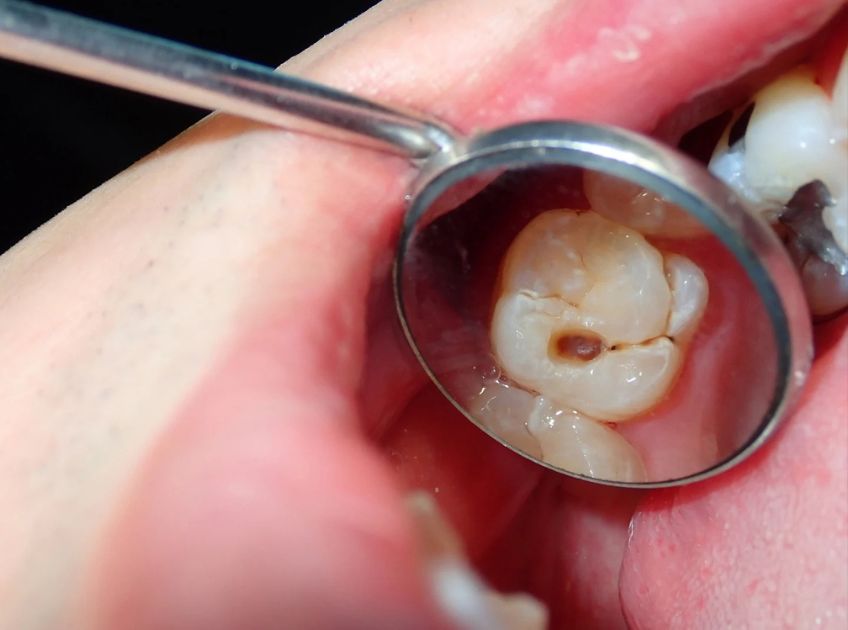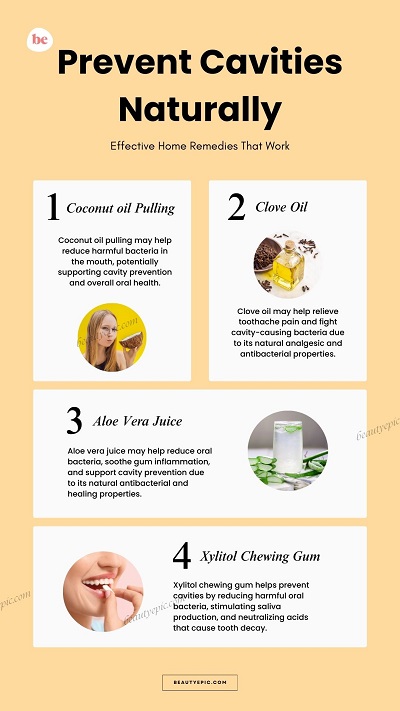
Important: This article is for informational purposes only. Please read our full disclaimer for more details.
Cavities—also known as dental caries—are tiny holes in the teeth caused by the breakdown of enamel due to bacteria, acids, and plaque buildup (1). While brushing and flossing are essential, you might be surprised to learn that natural remedies can also help protect your teeth. If you’re looking to avoid costly dental treatments and reduce chemical exposure, read on to discover science-backed, natural ways to prevent cavities and boost oral health.
Nature’s Arsenal: Effective Home Remedies to Prevent Cavities
These gentle yet powerful remedies can help keep cavities at bay:
1. Oil Pulling with Coconut Oil
This ancient Ayurvedic practice involves swishing oil in your mouth to remove bacteria.
- How it works: Coconut oil contains lauric acid, which has antimicrobial properties that can reduce harmful oral bacteria like Streptococcus mutans, one of the primary culprits of cavities.
- How to use: Swish 1 tablespoon of coconut oil in your mouth for 10–15 minutes daily, then spit it out and rinse.
2. Clove Oil
Clove has long been used to relieve tooth pain, but it also helps prevent decay.
- Why it works: Clove oil contains eugenol, a natural anesthetic and antibacterial compound.
- Use it: Dab a drop on your toothbrush or dilute with a carrier oil and massage onto gums.
3. Aloe Vera Juice
Aloe isn’t just for burns—it’s also great for teeth.
- Scientific support: A study published in the Journal of Dentistry found that aloe vera juice was just as effective as chlorhexidine mouthwash at reducing plaque and gingivitis (2).
- Use it: Rinse your mouth with food-grade aloe vera juice for 1 minute daily.
4. Xylitol Chewing Gum
A natural sugar alcohol, xylitol, reduces cavity-causing bacteria.
- Research: Studies show xylitol can reduce plaque accumulation and neutralize acids.
- How to use: Chew xylitol-sweetened gum after meals to increase saliva and protect enamel.
When to See a Dentist: Don’t Wait Too Long
While natural remedies can be very effective, they aren’t a replacement for professional care.
See a dentist if you experience:
- Tooth sensitivity that lasts more than a few days
- Visible holes or dark spots on your teeth
- Persistent bad breath or bleeding gums
Early intervention can prevent minor issues from becoming major problems.
The Science Behind Natural Cavity Prevention
- Coconut oil and lauric acid: Research in the Journal of Contemporary Dental Practice supports coconut oil’s effectiveness against cavity-causing bacteria (3).
- Clove oil’s eugenol: Used in dentistry for decades, eugenol is both antiseptic and anti-inflammatory (4)(5).
- Xylitol: A 2004 review in Caries Research concluded that xylitol reduces Streptococcus mutans and helps prevent caries development (6).
These ingredients aren’t just “old wives’ tales”—they’re grounded in science.
Frequently Asked Questions (FAQ’S)
Q1. Can diet help prevent cavities naturally?
A. Yes! Eating a low-sugar, mineral-rich diet that includes leafy greens, dairy, and nuts can help remineralize enamel and reduce cavity risk.
Q2. Is brushing with baking soda safe for cavity prevention?
A. Occasionally, yes. Baking soda is mildly abrasive and can neutralize acids, but use it 1–2 times a week to avoid enamel wear.
Q3. Do natural remedies reverse existing cavities?
A. They can help stop early demineralization, but once a cavity forms, only a dentist can restore the tooth. Use natural methods as preventive care.
Preventing cavities doesn’t have to rely solely on fluoride or expensive treatments. With simple ingredients like coconut oil, aloe vera, and clove, you can naturally support your oral health. Just remember: consistency is key, and professional dental care should still be part of your long-term plan.
















